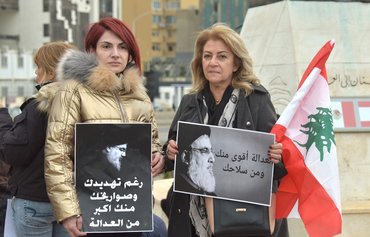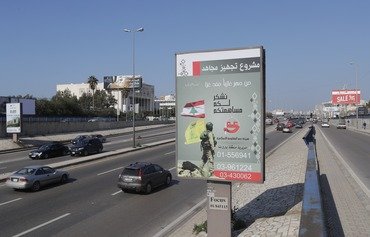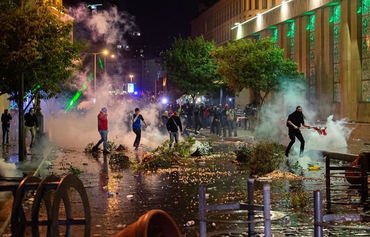BEIRUT -- The latest round of US sanctions targeting Hizbullah financiers and money launderers highlights the "corrupt and destabilising activities" that are helping the Iran-backed party profit at the expense of the Lebanese people.
The United States imposed sanctions on three Hizbullah-linked financial facilitators and their Lebanon-based travel company on January 18.
The individuals were named as Adel Ali Diab, a Lebanese businessma; Ali Muhammad Daoun, a Hizbullah official in charge of the party's second district in southern Lebanon; and Jihad Salem Alame, another party official.
The business they share is Lebanon-based Dar al-Salam for Travel and Tourism.
![A demonstrator holds a sign denouncing Hizbullah and Iran during an October 13 protest in front of the Palace of Justice in Beirut. [Ziad Hatem/Al-Mashareq]](/cnmi_am/images/2022/01/28/33688-Iran-out-demonstration-600_384.jpg)
A demonstrator holds a sign denouncing Hizbullah and Iran during an October 13 protest in front of the Palace of Justice in Beirut. [Ziad Hatem/Al-Mashareq]
![Two women hold a sign denouncing Iran during a demonstration held in front of the Palace of Justice on October 13. [Ziad Hatem/Al-Mashareq]](/cnmi_am/images/2022/01/28/33690-Iran-out-women-600_384.jpg)
Two women hold a sign denouncing Iran during a demonstration held in front of the Palace of Justice on October 13. [Ziad Hatem/Al-Mashareq]
US Secretary of State Antony Blinken said the United States was taking this action "in solidarity with the Lebanese people, whose security and sovereignty remains threatened by Hizbullah's corrupt and destabilising activities".
"As the Lebanese people suffer an economic crisis of historic proportions, Hizbullah continues to engage in illicit activity and amass wealth at the expense of the Lebanese people," he said.
"It is clear Hizbullah and its associates are more concerned with advancing their own interests and those of their patron, Iran, than the best interests of the Lebanese people."
The sanctions disrupt "businessmen who raise and launder funds for Hizbullah's destabilising activities" while the Lebanese people face worsening crises, said Under Secretary of the Treasury for Terrorism and Financial Intelligence Brian Nelson.
Hizbullah claims it supports the Lebanese people, he said, but "continues to profit from insulated business ventures and backdoor political deals, amassing wealth that the Lebanese people never see".
'Stark example of Hizbullah's abuses'
On January 21, the United States also designated Hizbullah-affiliated financial facilitator Adnan Ayad, as well as members of an international network of facilitators and companies connected to him and to Diab.
Diab served as Ayad's business partner and fellow Hizbullah financier, the US State Department said.
Ayad, Diab, Jihad Adnan Ayad and 10 companies were designated under an executive order which targets terrorists, leaders and officials of terrorist groups, and those providing support to terrorists or acts of terrorism.
The sanctioned firms are Hamer and Nail Construction Ltd.; Hamidco Investment Ltd.; Lebanon-based Al Amir Co. for Engineering, Construction and General Trading SARL; Golden Group SAL Offshore; Inshaat Co SARL; Land Metics SARL; Landmetics SAL Off-Shore; Golden Group Trading SARL; Top Fashion GmbH Konfektionsbügelei; and Jammoul and Ayad for Industry and Trade.
"These financial facilitators have helped Hizbullah obtain funds through networks of companies that disguise themselves as legitimate businesses," the State Department said in its January 21 announcement.
The sanctions evasion efforts "are a stark example of how Hizbullah abuses the international financial system to fund its acts of terrorism and illicit activities", it said.
Party at root of economic collapse
Observers noted that the latest round of sanctions comes amid a general paralysis in Lebanon and an economic and political crisis that many Lebanese blame on systemic corruption and Iran-backed Hizbullah.
The World Bank has described the crisis in Lebanon as one of the most severe globally in a century and a half.
The foreign currency reserves of the Central Bank of Lebanon (BDL) are "barely sufficient for the minimum mandatory reserve, which allows legal coverage of depositors' money in private banks", it said.
"Economic observers agree that Hizbullah is the main cause of the economic collapse, both directly and indirectly," political journalist Anthony Geagea told Al-Mashareq.
The party has contributed to the economic crisis by controlling air, sea and land ports and border crossings and through smuggling, money laundering and manipulation of the financial markets, he said.
It also has become embroiled in foreign wars in Yemen, Iraq and Syria, to Lebanon's detriment, Geagea said.
Economist Violette Ghazal al-Balaa said the sanctions imposed on the Hizbullah-linked companies and financial facilitators are part of the enforcement of the US Hizbullah International Financing Prevention Act of 2015.
She said the US Treasury targets Hizbullah's continuous attempts to exploit the global financial sector to evade sanctions.
It is likely that "the latest batch of sanctions will increase the extent of the financial troubles that the party is experiencing, leading to stifling hardship in its closed environment", she added.
Political analyst Asaad Bishara said the US policy regarding the sanctions on Hizbullah "is likely to escalate in the future as the party continues to launder money and engage in illegal activities that have put Lebanon on the black list".
Hizbullah "has caused severe damage to the Lebanese economy, and is the primary factor responsible for the financial collapse in the country and the stifling economic distress that the Lebanese are experiencing", he said.
The party has turned Lebanon into an arena of Iranian influence, he said, "which has led to the near-severance of its link to the Arab world, the Gulf countries and the international community".

![Lebanese protesters demonstrate in front of the Palace of Justice on October 13 against Iran and Hizbullah and in support of Judge Tarek al-Bitar, who is leading the investigation into the August 2020 Beirut port explosion. [Ziad Hatem/Al-Mashareq]](/cnmi_am/images/2022/01/28/33687-Anti-Hizbullah-protest-600_384.jpg)






